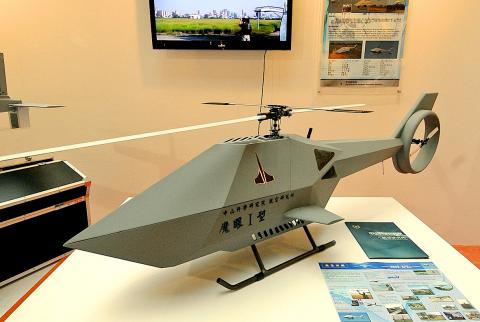The military said it is able to effectively detect military deployments in China through the use of unmanned aerial vehicles (UAVs), after it expanded detection zones from airspace over eastern and southern Taiwan to airspace over the Taiwan Strait.
According to a military official, who wished to remain anonymous, the US has expressed concern over how the UAV project has developed and military missions the drones are commissioned to perform.
The US has demanded that the Ministry of National Defense send specialists to brief the US Department of Defense on the project before a delegation was to head to the US for a meeting about bilateral cooperation on military issues involving high-level officials from both countries, the military official said.

Photo: Fang Pin-chao, Taipei Times
A UAV launched from a base in western Taiwan would be able to detect military movement in China’s southeast coastal area, he said.
Given Taiwan’s proximity to China, the capability of the UAVs to detect military deployments on the other side of the Taiwan Strait is highly valued by the US, he said.
Despite the US having sophisticated UAVs that can fly long distances to access the area, there are concerns within the US military that such missions would be costly, as well as there being political and military issues preventing its use of UAVs in the area, he added.
The UAV development program was undertaken by the National Chungshan Institute of Science and Technology. It has delivered 32 UAVs to the army.
In addition to Taimali (太麻里) in Taitung County, where the UAVs are based and training exercises are carried out, the ministry has been in talks with the Civil Aeronautics Administration over the possibility that part of the Hengchun airport in Pingtung could be used as another training base for the drones.
According to sources from the military, the air force’s airspace training area is within the range of missiles deployed in southeast China, making it impossible for the air force to carry out missions in the areas that the UAVs can access.
The military said it was still deliberating whether it would deploy the UAVs in western Taiwan.

The CIA has a message for Chinese government officials worried about their place in Chinese President Xi Jinping’s (習近平) government: Come work with us. The agency released two Mandarin-language videos on social media on Thursday inviting disgruntled officials to contact the CIA. The recruitment videos posted on YouTube and X racked up more than 5 million views combined in their first day. The outreach comes as CIA Director John Ratcliffe has vowed to boost the agency’s use of intelligence from human sources and its focus on China, which has recently targeted US officials with its own espionage operations. The videos are “aimed at

STEADFAST FRIEND: The bills encourage increased Taiwan-US engagement and address China’s distortion of UN Resolution 2758 to isolate Taiwan internationally The Presidential Office yesterday thanked the US House of Representatives for unanimously passing two Taiwan-related bills highlighting its solid support for Taiwan’s democracy and global participation, and for deepening bilateral relations. One of the bills, the Taiwan Assurance Implementation Act, requires the US Department of State to periodically review its guidelines for engagement with Taiwan, and report to the US Congress on the guidelines and plans to lift self-imposed limitations on US-Taiwan engagement. The other bill is the Taiwan International Solidarity Act, which clarifies that UN Resolution 2758 does not address the issue of the representation of Taiwan or its people in

US Indo-Pacific Commander Admiral Samuel Paparo on Friday expressed concern over the rate at which China is diversifying its military exercises, the Financial Times (FT) reported on Saturday. “The rates of change on the depth and breadth of their exercises is the one non-linear effect that I’ve seen in the last year that wakes me up at night or keeps me up at night,” Paparo was quoted by FT as saying while attending the annual Sedona Forum at the McCain Institute in Arizona. Paparo also expressed concern over the speed with which China was expanding its military. While the US

SHIFT: Taiwan’s better-than-expected first-quarter GDP and signs of weakness in the US have driven global capital back to emerging markets, the central bank head said The central bank yesterday blamed market speculation for the steep rise in the local currency, and urged exporters and financial institutions to stay calm and stop panic sell-offs to avoid hurting their own profitability. The nation’s top monetary policymaker said that it would step in, if necessary, to maintain order and stability in the foreign exchange market. The remarks came as the NT dollar yesterday closed up NT$0.919 to NT$30.145 against the US dollar in Taipei trading, after rising as high as NT$29.59 in intraday trading. The local currency has surged 5.85 percent against the greenback over the past two sessions, central